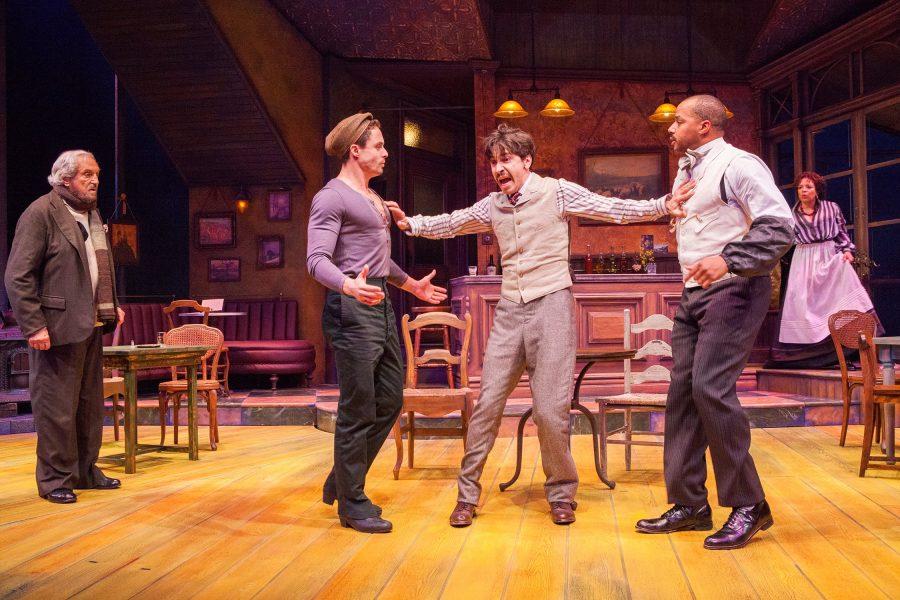Steve Martin’s first full-length play, originally performed in 1993, is undergoing a revival at The Old Globe. The show, while undeniably entertaining and graced with an incredible set and cast, never quite finds its footing; bits of potential deeper meaning are lost underneath carefully crafted banter and increasingly surreal events. “Picasso at the Lapin Agile” sets out to explore the nature of genius and how the world responds to young men who will become giants, but this exploration becomes muddled by its conclusion.
At the Lapin Agile, a Parisian bar historically frequented by the titular Pablo Picasso, a lively set of characters comes to drink, socialize or wait for Picasso himself to arrive. As customers trickle in for a night of drinking, even the side characters get a bit of spotlight: The eternally cheerful barkeep Freddy (Donald Faison), regular customer and “newly old” Gaston (Hal Linden) and Picasso admirer Suzanne (Liza Lapira) play off of each other wittily enough to make us forget that Picasso himself is absent. But while the Parisians recognize the standard characters of a Paris bar scene, 25-year-old Swiss patent officer Albert Einstein (Justin Long) is a total mystery — in a good way. It takes some time to reconcile the popular conception of an elderly, widely recognized Einstein with a young man who is earnest, yes, but also seems to miss social conventions left and right. Fortunately, the banter between Einstein and the other bar patrons, especially the forward-thinking Germaine (Luna Vélez), eventually does ground him in the setting, even if it never quite feels like he belongs. Martin’s Einstein is a fun and interesting enough character to justify his presence, but through an enthusiastic lack of social awareness, Long’s portrayal feels more like a parody of who Einstein could have been rather than a genuine homage.
It takes Picasso half of the play to finally show up and for the audience to finally see who the fuss is all about. Philippe Bowgen manages to portray a womanizing, charismatic version of the famous painter sympathetically. Bowgen’s Picasso unapologetically grandstands and brags about his genius to every person in the Lapin Agile, yet through Martin’s brand of clever over-the-top comedy, he comes across as so charming and theatrical that we excuse his vices — at first. Picasso, at least, has much less time than Einstein to make it clear that his characterization is a little flat. As the two men meet, the contrast between the self-important Picasso’s brand of sudden creative genius and Einstein’s inaccessible, contemplative genius is so stark that it seems natural for them to completely fail to understand each other. The two men spar verbally in the manner of their genius until, somehow, they embrace each other on a tabletop as brothers. I say ‘somehow’ because this moment of understanding represents a complete 180-degree turn from the passion of their arguments through a single agreement. Perhaps this is, simply, the nature of genius: If so, then this play did not end on its punch line.
“Picasso” is an undeniably well-written, funny comedy; Martin’s name is enough to prove that. The supporting characters, for the most part, have enough nuance to feel as though they are complete people we only see one side of. However, the one-sided near-caricatures of Picasso and Einstein themselves, along with banter filled with references only our parents would understand, set “Picasso” as a play in no way aimed toward college students.
For a play put on by The Old Globe theater, which made its name on Shakespeare performances, “Picasso” is a bit on the edgy, experimental side. But, for experimental plays, “Picasso” is decidedly tame and unsatisfying. It sits in the awkward middle ground between a traditional theatrical performance and the self-aware extravagance of modern risk-taking theater; to attend this play and expect either is a mistake. “Picasso” neither pushes the boundaries far enough to excuse its one-sided characterizations of the main characters, nor takes itself seriously enough to follow through with its explorations of genius. Its surreal events seem surreal for its own sake, and they seem to be played for fan-service rather than for meaning. To a fringe-theater newcomer, though, “Picasso” might be a perfect introduction to theater which comments on itself and breaks the fourth wall when the opportunity strikes. It is, if nothing else, successful comedy.
Grade: B-
Writer: Steve Martin
Starring: Philippe Bowgen, Justin Long
Runs: February 4 – March 12
Location: The Old Globe
Photo by Jim Cox








